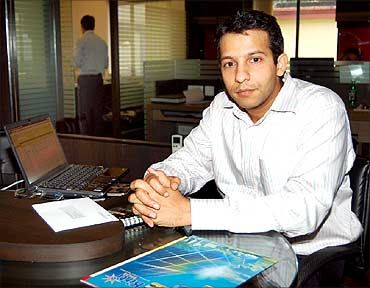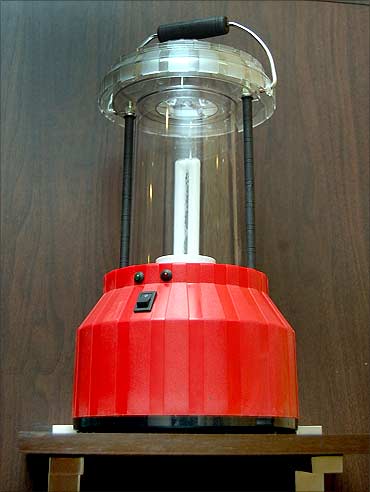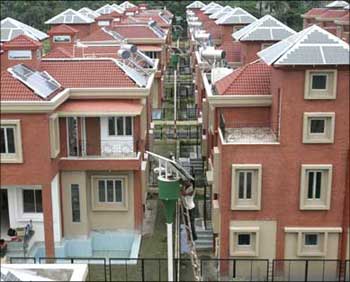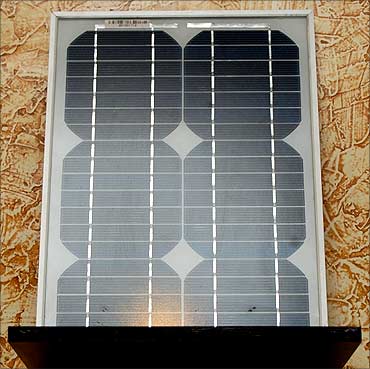Photographs: Dipak Chakraborty Indrani Roy Mitra in Kolkata
India, where most regions enjoy nearly 300 sunny days a year, is an ideal market for solar power companies.
However, the high cost of light-to-electricity conversion -- at Rs 12 to Rs 20 per kilowatt-hour -- has acted as a deterrent so far.
According to a Business Standard report, India has about 60 companies assembling and supplying solar photovoltaic systems, nine companies manufacturing solar cells and 19 companies manufacturing photovoltaic modules or panels.
Kolkata-based Kirti Solar Ltd has decided to be a cog in the wheel of solar power generation in our country.
In a conversation with rediff.com, Dhiraj Bhagchandka, managing director of the company, speaks about his company and how it plans to bring light to Indian villages.
...
He plans to bring solar light to 500 schools in North East
Image: Solar panels sit on the roof of SunPower Corporation in Richmond, California.Photographs: Kim White/Reuters
Why did you plan to venture into solar power? What has been your incentive?
India, at the moment, is suffering from an acute shortage of power. It's high time we thought of some alternative source of energy.
Besides, when the entire world is strategising hard to cut down on carbon emissions, we felt it was necessary to do something with solar energy.
Ours is a vast country that is often plagued by power shortage. We thought of countering this problem by developing a green alternative.
Thereafter, Kirti Solar Limited came into being a couple of years back as an offshoot of the Pekon Group.
...
He plans to bring solar light to 500 schools in North East
Image: A solar lamp made by Kirti.Photographs: Dipak Chakraborty.
Your parent group -- Pekon -- is also into the renewable energy business, right?
Yes. Kirti Solar Limited is a venture of the Pekon Group -- a diversified conglomerate with interests in electronics, textiles, power, real estate and infrastructure.
Pekon has partnered with Skypower Corporation (Canada), a renewable energy company, to develop wind and solar-based power projects in India.
We at Kirti plan to further the development of the renewable energy by leveraging global markets and technologies for the Indian market.
Solar power has immense potential to reduce carbon emission in the environment, which is a primary objective of all leading nations across the world.
...
He plans to bring solar light to 500 schools in North East
Image: A labourer checks the solar panel of a street light at a solar housing complex in Kolkata.Photographs: Parth Sanyal/Reuters
You completed Masters in financial engineering from Stanford University. What is the connection between financial engineering and renewable energy business?
The connection is quite simple. Solar energy comes at a heavy price and often becomes unaffordable for most. However, at Kirti, our task is to find ways to make solar energy easily available at an affordable price.
In Uttar Pradesh, we have tied up with several gramin banks so that the rural people get loans, to buy solar energy, to the tune of Rs 5,000-10,000 for 5 years at the rate of an equated monthly instalment of Rs 300 per month.
It's simple arithmetic, you see. In villages, one household spends about Rs 200-300 per month on kerosene. If they spend the same amount on getting solar energy, they will be motivated to go for the latter.
Also, buying solar energy means a one-time investment for the villagers.
It is in this context that my knowledge of financial engineering comes in handy.
We, at Kirti, are in talks with several other banks in Bengal and Bihar and we do hope to achieve a lot in the next few years.
...
He plans to bring solar light to 500 schools in North East
Image: A solar panel made by Kirti.Photographs: Dipak Chakraborty
What is your opinion about solar power in India?
India is at the threshold of opportunity to grow and expand its adoption of photo-voltaic systems.
Our country has an enormous potential for using off-grid PV for rural lighting and electrification, irrigation pumps, powering mobile communication, captive power generation, street and highway lighting, automated teller machines, powering schools, medical units, government offices etc.
Take the case of telecom towers, for example. Our research tells us there are about 2,50,000 telecom towers in India. If they are solarised, imagine to what extent carbon emission can be reduced.
This will generate jobs, too, right?
Of course! The PV industry would create thousands of jobs in research and development, manufacturing, maintenance, installation and consultancy.
It's high time the Government of India took some concrete steps in this regard.
...
He plans to bring solar light to 500 schools in North East
Image: This fan runs on solar power.Photographs: Dipak Chakraborty
What are your future plans?
Our priority at the moment is to make solar power poular in Indian villages. We have started working extensively in Uttar Pradesh and have launched wind-based power projects in Maharashtra.
We are holding meetings with banks and other rural financial institutions across the country to help the rural population avail of solar energy. We are trying to send across the message: our future lies in solar power, we cannot afford to ignore it.
Our immediate plan is to solarise 500 schools in north-eastern India. As the project is in its final stage, I won't be able to disclose the name of the states but once it is completed, it would add a glorious feather to our cap.
Do you think the future of solar power is bright in India?
Oh yes! A sea of opportunity lies. One just needs to grab it. Take the case of the cost of solar modules as an instance. Solar modules that used to come at a price of Rs 170/watt even a few years back is now available at Rs 70/watt. It is indeed an optimistic step forward.
I am sure things will look brighter a few years hence.
What, according to you, should the government do to popularise solar power?
In the ultimate count, the scope to make solar power a popular alternative lies with the government. As the world cries for a greener tomorrow, the onus rests on the government to do something about it.
If you ask me, the Indian government should take the following steps:
- Encourage and motivate citizens, builders, business houses etc to build solar rooftop systems. It can even make building rooftops mandatory for business houses, commercial and residential houses;
- Instead of subsidising diesel and petrol prices alone, the government should focus on bringing down the solar modules' prices further. It has a dual benefit: will cut down carbon emission and will lessen the burden on the state exchequer
- The process of buying solar power should be simplified bereft of the legal and bureaucratic hassles.
To get in touch with Kirti Solar Limited, write to: Solar@pekon.in or call 033-40646077







article